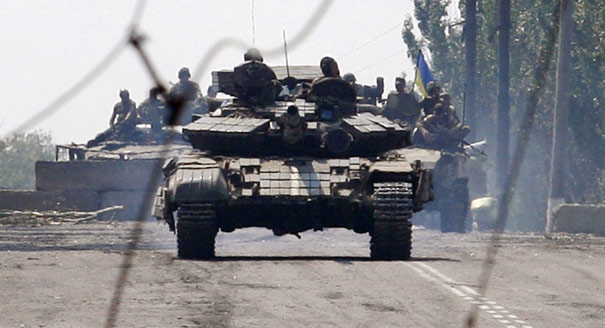Judy Dempsey
{
"authors": [
"Judy Dempsey"
],
"type": "commentary",
"blog": "Strategic Europe",
"centerAffiliationAll": "",
"centers": [
"Carnegie Endowment for International Peace",
"Carnegie Europe"
],
"collections": [
"Europe’s Eastern Neighborhood",
"Transatlantic Cooperation"
],
"englishNewsletterAll": "",
"nonEnglishNewsletterAll": "",
"primaryCenter": "Carnegie Europe",
"programAffiliation": "",
"programs": [],
"projects": [],
"regions": [
"Europe",
"Eastern Europe",
"Ukraine"
],
"topics": [
"Foreign Policy",
"Security",
"EU"
]
}
Source: Getty
Can Merkel Save Ukraine?
Angela Merkel’s efforts in trying to stop Russia from going to war in Ukraine have all but failed. She needs to change her strategy toward Vladimir Putin.
Ever since Vladimir Putin invaded Crimea last March, Angela Merkel has been one of the few Western leaders who has been constantly on the phone to the Russian president. U.S. President Barack Obama practically handed over the Ukraine dossier to the German chancellor, no longer willing to deal with the issue.
Even though Russia’s invasion of part of Ukraine five months ago has already had a monumental geostrategic impact, neither European leaders nor the U.S. administration (with few exceptions) have wished to recognize the new reality.
That reality is that Russia has been prepared to compete with the West over Ukraine. In doing so, Moscow has confirmed that it is not willing to come to terms with the post-Soviet settlement of independent sovereign states along Russia’s borders free to choose their own political path. In short, Putin is not willing to embrace the West’s economic, political, or social values.
The big EU countries did not want to acknowledge that Russia was setting the agenda in a competition that the West was clearly unprepared for. Nor did they internalize why a Western perspective for Ukraine was so important to the protesters on Kiev’s Maidan back in January and February.
Above all, the West tacitly accepted that Crimea was lost. That in itself was extraordinary given the implications of changing Europe’s post–Cold War borders by force. It was as if the West had learned nothing from Russia’s short war in Georgia in 2008. At that time, the West’s hand-wringing, soon followed by business as usual with Russia, surely convinced Putin that he could bide his time over Ukraine. And he has been proved right.
The West’s weak sanctions and its refusal to understand the enormous implications of Putin’s illegal annexation of Crimea showed the Russian president that he had little need to worry about the West’s halfhearted use of soft power and its rejection of hard power.
Yet as soon as the Ukrainians started fighting to regain their territory—against Western advice, by the way—Putin’s green men and the pro-Russian rebels had a fight on their hands. Ukraine’s recent victories in regaining towns in eastern Ukraine confirmed Putin’s short-term aims in response to hard power. He was and is determined not to let Ukraine out of his grasp, whatever the cost. That is why on August 27, Russia sent in more troops.
A NATO military officer monitoring events on the ground said, “We assess well over 1,000 Russian troops are now operating inside Ukraine. They are supporting separatists (and) fighting with them.”
The U.S. ambassador to Kiev, Geoffrey Pyatt, tweeted:
1/3 Russian supplied tanks, armored vehicles, artillery and multiple rocket launchers have been insufficient to defeat Ukraine' armed forces
— Geoffrey Pyatt (@GeoffPyatt) August 28, 20142/3 So now an increasing number of Russian troops are intervening directly in fighting on Ukrainian territory
— Geoffrey Pyatt (@GeoffPyatt) August 28, 20143/3 Russia has also sent its newest air defense systems including the SA-22 into eastern Ukraine & is now directly involved in the fighting.
— Geoffrey Pyatt (@GeoffPyatt) August 28, 2014The Kremlin is playing down Russia’s involvement in Ukraine. But a member of Putin’s advisory council on human rights, Ella Polyakova, told Reuters she believed Russia was carrying out an invasion of Ukraine. “When masses of people, under commanders’ orders, on tanks, APCs and with the use of heavy weapons, (are) on the territory of another country, cross the border, I consider this an invasion,” she said.
Merkel now has to decide what steps to take. The first thing she needs to realize is that Ukraine is at war. The country was at war before, but somehow European leaders preferred to use euphemisms when describing the conflict. Yet however much Germans and other Europeans dread the idea of war, this is what is happening on the EU’s doorstep.
French President François Hollande said on August 28 it would be “intolerable and unacceptable” if it was proved true that Russian soldiers had entered Ukrainian territory. Didn’t Hollande know that Russian troops had invaded Crimea and that Ukraine had been engaged in a war since March?
Of course, Putin’s calculation is that the Europeans are not going to send soldiers to Ukraine to fight against Russia. His other calculation is that NATO will not dispatch troops either. The most the alliance will do is to beef up security in Poland and the Baltic states.
What Merkel (and Obama) can do is to rally European leaders into imposing much harsher sanctions—and quickly. That will demand united political will and courage. And NATO should step up its defense cooperation with Ukraine.
Those European leaders who believe such steps would only provoke Russia should take a hard look at what is happening on the ground in eastern Ukraine and what the Russian president is doing to his own country. Vladimir Putin is leading Russia away from the West. It is not in Europe’s interests that he wants to use sheer force to drag other countries with him.
About the Author

Nonresident Senior Fellow, Carnegie Europe
Dempsey is a nonresident senior fellow at Carnegie Europe
- Europe Needs to Hear What America is SayingCommentary
- Babiš’s Victory in Czechia Is Not a Turning Point for European PopulistsCommentary
Judy Dempsey
Recent Work
Carnegie does not take institutional positions on public policy issues; the views represented herein are those of the author(s) and do not necessarily reflect the views of Carnegie, its staff, or its trustees.
More Work from Strategic Europe
- Europe on Iran: Gone with the WindCommentary
Europe’s reaction to the war in Iran has been disunited and meek, a far cry from its previously leading role in diplomacy with Tehran. To avoid being condemned to the sidelines while escalation continues, Brussels needs to stand up for international law.
Pierre Vimont
- Taking the Pulse: Can European Defense Survive the Death of FCAS?Commentary
France and Germany’s failure to agree on the Future Combat Air System (FCAS) raises questions about European defense. Amid industrial rivalries and competing strategic cultures, what does the future of European military industrial projects look like?
Rym Momtaz, ed.
- Macron Makes France a Great Middle PowerCommentary
France has stopped clinging to notions of being a great power and is embracing the middle power moment. But Emmanuel Macron has his work cut out if he is to secure his country’s global standing before his term in office ends.
Rym Momtaz
- How Europe Can Survive the AI Labor TransitionCommentary
Integrating AI into the workplace will increase job insecurity, fundamentally reshaping labor markets. To anticipate and manage this transition, the EU must build public trust, provide training infrastructures, and establish social protections.
Amanda Coakley
- Can Europe Still Matter in Syria?Commentary
Europe’s interests in Syria extend beyond migration management, yet the EU trails behind other players in the country’s post-Assad reconstruction. To boost its influence in Damascus, the union must upgrade its commitment to ensuring regional stability.
Bianka Speidl, Hanga Horváth-Sántha










